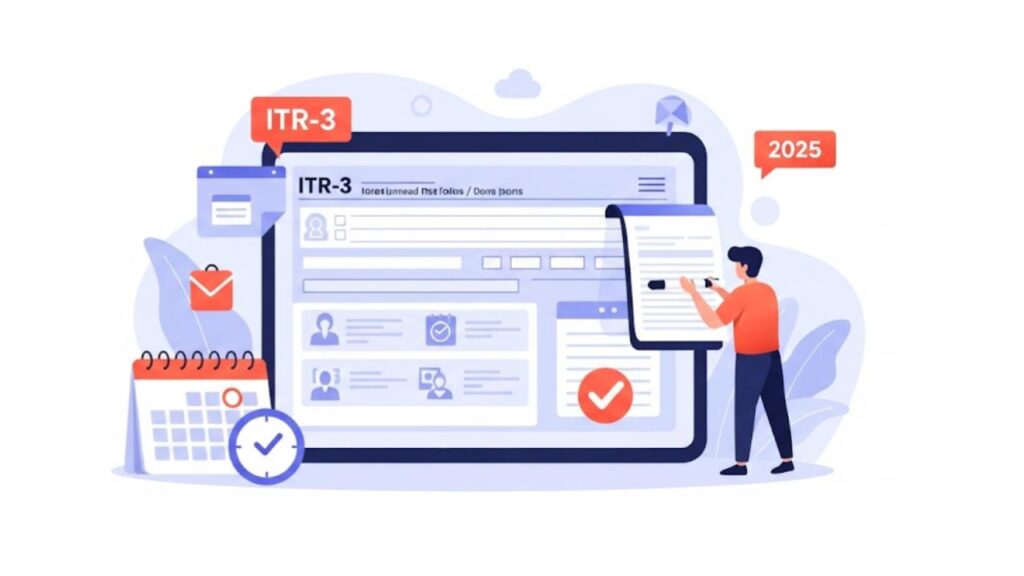Filing taxes can often feel like you’re navigating a complicated maze of numbers, forms, and regulations. But when it comes to filing ITR-3 for 2025, one question seems to pop up quite a bit: Is bookkeeping mandatory? Whether you’re a freelancer, small business owner, or professional, understanding the importance of bookkeeping and how it impacts your tax filing is crucial. In this article, we’re going to break down everything you need to know about ITR-3 filing in 2025, including when and why bookkeeping is necessary, and the steps to ensure you stay compliant.

ITR-3 Filing 2025
| Topic | Details |
|---|---|
| What is ITR-3? | ITR-3 is for individuals and Hindu Undivided Families (HUFs) with income from business or profession. |
| Bookkeeping Requirement | Mandatory for tax audits or when trading in F&O, with turnovers exceeding certain thresholds. |
| When is Bookkeeping Required? | When income exceeds ₹1 crore for business or ₹50 lakh for professionals, or if subject to tax audit. |
| Due Dates for Filing | Without audit: September 15, 2025; with audit: October 31, 2025. |
| Key Changes for AY 2025-26 | Asset and liability reporting thresholds, capital gains clarification, VDA income updates. |
| Official Resources | Income Tax Department |
Bookkeeping is more than just a good habit—it’s often mandatory for individuals and businesses filing ITR-3 in 2025. Whether you’re required to maintain books because of a tax audit or simply to ensure accurate tax filing, keeping track of your finances is crucial. So, don’t wait until the last minute—start organizing your books today and avoid any last-minute headaches come tax season.
What is ITR-3?
ITR-3 is one of the most commonly used tax forms in India, specifically designed for individuals and Hindu Undivided Families (HUFs) who earn income from a business or profession. Whether you’re running a small consulting firm, a freelance graphic designer, or managing a sole proprietorship, if you are filing taxes under ITR-3, it’s important to understand the filing requirements.
The form is used by those who receive income from various sources, including:
- Business Income: Income from any business or profession.
- Capital Gains: Earnings from selling assets like property, stocks, or bonds.
- Income from Salary: For those employed but also running a side business or freelancing.
- Other Income: Dividends, interest, etc.
For anyone who fits these criteria, ITR-3 is the form you will use to file your taxes in 2025.
Why Is Bookkeeping Important for ITR-3?
Now, let’s dive into the burning question: Is bookkeeping mandatory for ITR-3 filing? The short answer is: Yes, in many cases, bookkeeping is not just important—it’s mandatory.
When is Bookkeeping Required?
Bookkeeping is necessary for individuals and businesses filing ITR-3 under the following circumstances:
- Tax Audit Under Section 44AB: If your business turnover exceeds ₹1 crore (₹10 crore for businesses opting for the presumptive taxation scheme under Section 44AD) or if you are a professional with gross receipts exceeding ₹50 lakh, a tax audit is required, and proper books of accounts are essential.
- F&O Trading: If you’re involved in trading futures and options (F&O), the Income Tax Department considers it business income. This means you will need to maintain books of accounts, regardless of the turnover. A lot of traders overlook this, but failing to maintain accurate records can lead to trouble during audits.
Why Should You Care About Bookkeeping?
Even if a tax audit isn’t required, keeping proper records can help you:
- Claim eligible deductions: Many expenses, including business-related ones, can be written off. But without accurate records, you could miss out.
- Track your financial health: Whether you’re running a business or freelancing, understanding where your money is going is key to making smarter decisions.
How to Maintain Bookkeeping for ITR-3?
Now that we’ve established that bookkeeping is often mandatory, let’s look at how you can maintain accurate records to make the filing process easier. Here’s a simple guide to follow:
Step 1: Choose Your Bookkeeping Method
There are two main ways to track your financial transactions:
- Manual Books: This could be as simple as maintaining a physical ledger. However, this method is increasingly outdated, especially for businesses that deal with large volumes of transactions.
- Accounting Software: Many small business owners and freelancers now use software like Tally, QuickBooks, or Zoho Books. These tools make it easier to track income, expenses, and prepare for tax filing.
Step 2: Categorize Your Income and Expenses
Organize your financial records by categories, such as:
- Revenue/Income: Money earned from your business, freelance gigs, or investments.
- Expenses: Costs related to running your business (e.g., rent, utilities, software, travel, etc.)
- Assets and Liabilities: If you own property or owe debts, make sure these are recorded as well.
Step 3: Keep All Receipts and Invoices
It’s essential to keep all receipts and invoices that show proof of transactions. These will serve as evidence if you need to claim deductions or respond to questions from tax authorities.
Step 4: Regularly Update Your Books
Make it a habit to update your books regularly—ideally every week or month. This will save you a lot of stress when it’s time to file your taxes.
Step 5: Reconcile Your Books
At the end of each quarter or year, reconcile your books to ensure everything matches up. This includes matching your bank statements and credit card statements with your books.
Key Changes in ITR-3 for AY 2025-26
Every year, the Income Tax Department updates forms like ITR-3 to address changing tax laws and improve the filing process. Here’s a quick rundown of some of the key changes to expect in 2025:
1. Asset and Liability Reporting
The threshold for reporting assets and liabilities has been increased to ₹1 crore. This means that if the total value of your assets (e.g., real estate, stocks, savings) exceeds ₹1 crore, you’ll need to report them.
2. Capital Gains Reporting
Taxpayers will be required to specify whether their capital asset transfer occurred before or after July 23, 2024, as different tax rates apply based on this timeline.
3. Virtual Digital Assets (VDAs)
There’s a lot of buzz around cryptocurrencies and NFTs these days, and the Income Tax Department has updated its reporting requirements for income from virtual digital assets (VDAs). This means if you’re into crypto or other digital assets, you’ll need to report this income.
FAQs
1. Do I need bookkeeping if I have a small side business?
If your side business brings in significant income (over ₹2.5 lakh) and you want to file ITR-3, it’s best to maintain proper books. Even if you don’t exceed the threshold for tax audits, accurate records will help during filing.
2. Can I file ITR-3 without bookkeeping?
Technically, you can file without bookkeeping, but it’s not advisable. Having a clear record of your income and expenses will help you file accurately and claim the correct deductions.
3. What if I don’t maintain books and my income is low?
If your income is under the thresholds for a tax audit, you may not face penalties immediately, but you could still miss out on deductions and have difficulty proving your claims during an audit.
4. How do I handle receipts for small expenses?
For small expenses, you can either maintain a physical copy or use digital receipts. Software like Zoho Books can help you store and organize receipts digitally.








